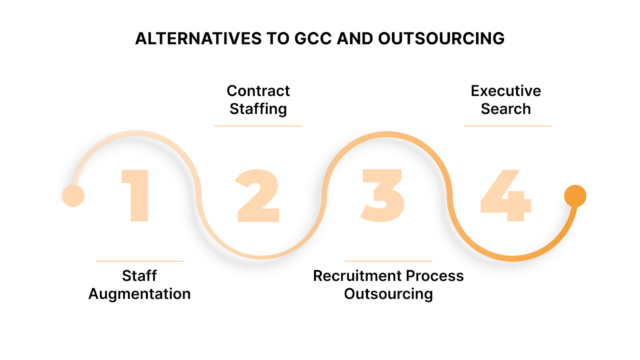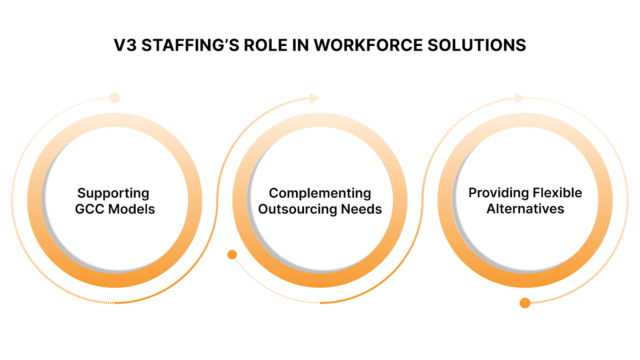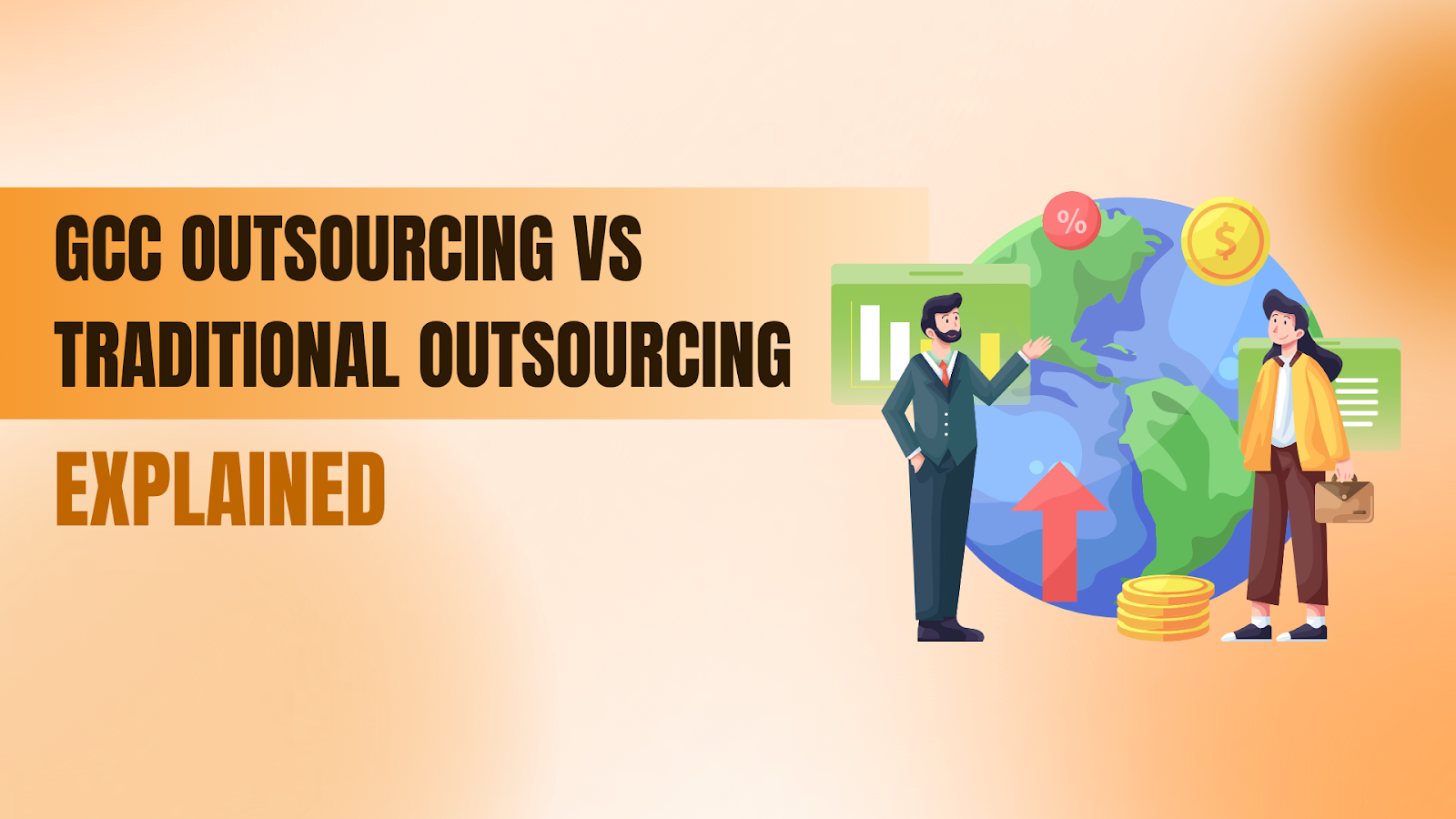Global Capability Centres are no longer just support functions. They have become engines of innovation and growth, with India’s GCC sector now employing more than two million professionals. For many organisations, these centres are driving product development, digital transformation, and advanced analytics.
This growth raises an important question for business leaders. Should you invest in building a GC C or continue with traditional outsourcing partners?
In this article, we unpack the differences between GCC outsourcing and outsourcing, explain when each model works best.
In a Nutshell:
- GCCs are designed for long-term capability building, while outsourcing is more suited to short-term or non-core needs.
- The decision depends on factors like control, cost, scalability, and data sensitivity.
- Many firms now adopt hybrid workforce models that combine GCCs, outsourcing, and staffing alternatives.
- India’s position as a global hub makes it one of the most attractive locations for GCC setup and expansion.
- Workforce partners and staffing solutions play a critical role in helping companies implement the right strategy.
What is a GCC?
A Global Capability Centre, or GCC, is a wholly owned subsidiary set up by a multinational company to manage critical business functions. Unlike outsourcing, where work is handed to a third party, a GCC operates as an extension of the parent organisation.
These centres often handle high-value work such as product engineering, research and development, finance, analytics, and IT.
What is Outsourcing?
Outsourcing is the practice of contracting specific business processes or projects to an external third-party provider. Companies often turn to outsourcing to reduce costs, access specialised skills, or manage non-core activities more efficiently. Commonly outsourced functions include IT support, payroll, customer service, and back-office operations.
Unlike a GCC, which is owned and operated by the parent company, outsourcing involves relying on an independent partner to deliver results.
Also Read: Best HR Consulting & Outsourcing Services in Hyderabad
Key Differences: GCC Outsourcing vs Outsourcing
Understanding the distinction between GCC outsourcing and traditional outsourcing is essential for leaders making long-term talent and operational decisions. While both models help organisations manage costs and scale faster, they differ significantly in control, ownership, and value creation.
| Factor | GCC Outsourcing (Global Capability Centre) | Traditional Outsourcing |
| Ownership & Control | Fully owned and managed by the parent firm | Managed by an external service vendor |
| Cost Structure | Higher upfront, but long-term value creation | Lower upfront, often variable ongoing |
| Talent Access | Direct access to in-house talent pool | Relies on vendor’s workforce |
| Scalability | Scales steadily, aligned with company goals | Scales quickly for short-term needs |
| Risk & Compliance | Controlled internally with company policies | Dependent on vendor’s frameworks |
| IP & Security | Greater protection within the company | Shared responsibility with the vendor |
Both models have their strengths. The choice comes down to whether a company values control and integration or prefers flexibility and lower initial costs.
When to Choose What?
Choosing between GCC outsourcing and traditional outsourcing depends on a company’s priorities, growth plans, and risk appetite. Each model serves different needs, and the right fit often comes down to the nature of the work and the organisation’s long-term vision.
When GCC outsourcing makes sense
- Building long-term capability and retaining knowledge in-house
- Managing critical functions such as product development, R&D, finance, or advanced analytics
- Ensuring higher control over data security, compliance, and intellectual property
- Strengthening brand presence and talent pipelines in key markets
When traditional outsourcing makes sense
- Handling non-core processes such as payroll, customer service, or routine IT support
- Managing seasonal demand or short-term project requirements
- Reducing operational costs without committing to long-term infrastructure
- Quickly accessing external expertise without expanding internal teams
Many organisations also adopt a hybrid model, where core functions are managed within a GCC while selected processes are outsourced. This blend offers strategic control along with flexibility.
Alternatives to GCC and Outsourcing

While GCC outsourcing and traditional outsourcing remain popular models, businesses are also exploring alternatives that balance cost, control, and scalability. These approaches can complement or substitute the two models depending on specific needs.
- Staff Augmentation: Companies can hire specialised professionals through a staffing partner for a limited period. This model is useful for filling skill gaps quickly without long-term commitments.
- Contract Staffing: Ideal for project-based or seasonal requirements, contract staffing offers flexibility while keeping compliance and payroll management with the staffing partner.
- Recruitment Process Outsourcing (RPO): Here, an external partner manages end-to-end recruitment on behalf of the company. RPO provides scalability and cost efficiency while allowing the organisation to retain control over its employees once hired.
- Executive Search: For leadership and senior roles, businesses often rely on specialised executive search firms. This ensures access to a targeted talent pool while maintaining confidentiality and precision in hiring.
These alternatives offer flexibility and can even work alongside GCCs or outsourcing to create a more balanced workforce strategy.
Also Read: The Benefits of Recruitment Process Outsourcing (RPO) for Your Business
V3 Staffing’s Role in Workforce Solutions

Choosing between GCC outsourcing, traditional outsourcing, or alternative staffing models can be complex. V3 Staffing simplifies this process by offering solutions that adapt to different workforce strategies.
1. Supporting GCC Models
- Enables enterprises to scale in-house teams quickly across technology and business functions.
- Offers Permanent Recruitment for long-term capability building and stable workforce growth.
- Provides IT Staffing to access niche technical talent in areas like cloud, data, and product engineering.
2. Complementing Outsourcing Needs
- Delivers Contract/Temporary Staffing to support short-term or project-based requirements with speed and compliance.
- Ensures pan-India coverage across major business hubs such as Hyderabad, Bengaluru, Chennai, Pune, Delhi NCR, and Mumbai.
3. Providing Flexible Alternatives
- Recruitment Process Outsourcing (RPO): End-to-end recruitment management with SLA-driven delivery, giving companies scalability while retaining hiring control.
- Executive Search: Targeted hiring for leadership, CXO, and senior roles through domain expertise and confidentiality.
- Staff Augmentation: On-demand access to skilled professionals for specific roles or timeframes without long-term commitments.
By combining domain expertise, SLA-driven processes, and regional strength, V3 Staffing acts as a trusted workforce partner, helping businesses build, scale, and optimise their workforce models with precision and reliability.
Conclusion
GCC outsourcing and traditional outsourcing both offer advantages depending on business priorities. Many companies now adopt a hybrid model, supported by staffing alternatives such as contract hiring or RPO, to strike the right balance.
V3 Staffing helps organisations simplify these choices by offering end-to-end workforce solutions. We ensure that enterprises can build the right workforce model with speed, precision, and reliability.
Looking to build the right workforce strategy for your business? Contact V3 Staffing today.
FAQs
Q. What do I need to know about GCC outsourcing vs traditional outsourcing?
A. GCC outsourcing gives me full control through a company-owned centre, while traditional outsourcing hands over processes to an external provider. The right choice depends on whether my priority is long-term capability or short-term flexibility.
Q. Why would my organisation consider setting up a GCC in India?
A. India offers access to a large and skilled workforce, competitive costs, and strong delivery hubs across major cities. For my company, this means faster scaling and the ability to build in-house expertise for critical functions.
Q. In what situations should I choose outsourcing instead of a GCC?
A. If I need to manage non-core functions like payroll, customer support, or IT helpdesk quickly and at a lower cost, outsourcing may be the better option. It works well when flexibility is more important than ownership.
Q. Can I balance both GCC outsourcing and traditional outsourcing?
A. Yes. Many enterprises like mine adopt a hybrid approach, keeping core, high-value functions in GCCs while outsourcing routine processes. This combination helps me balance control with scalability.
Q. How can V3 Staffing support my GCC or outsourcing strategy?
A. V3 Staffing helps companies like mine with Permanent Recruitment, Contract Staffing, IT Staffing, RPO, and Executive Search. With their expertise and presence in India’s key hubs, I can build the right workforce model faster and with more confidence.




